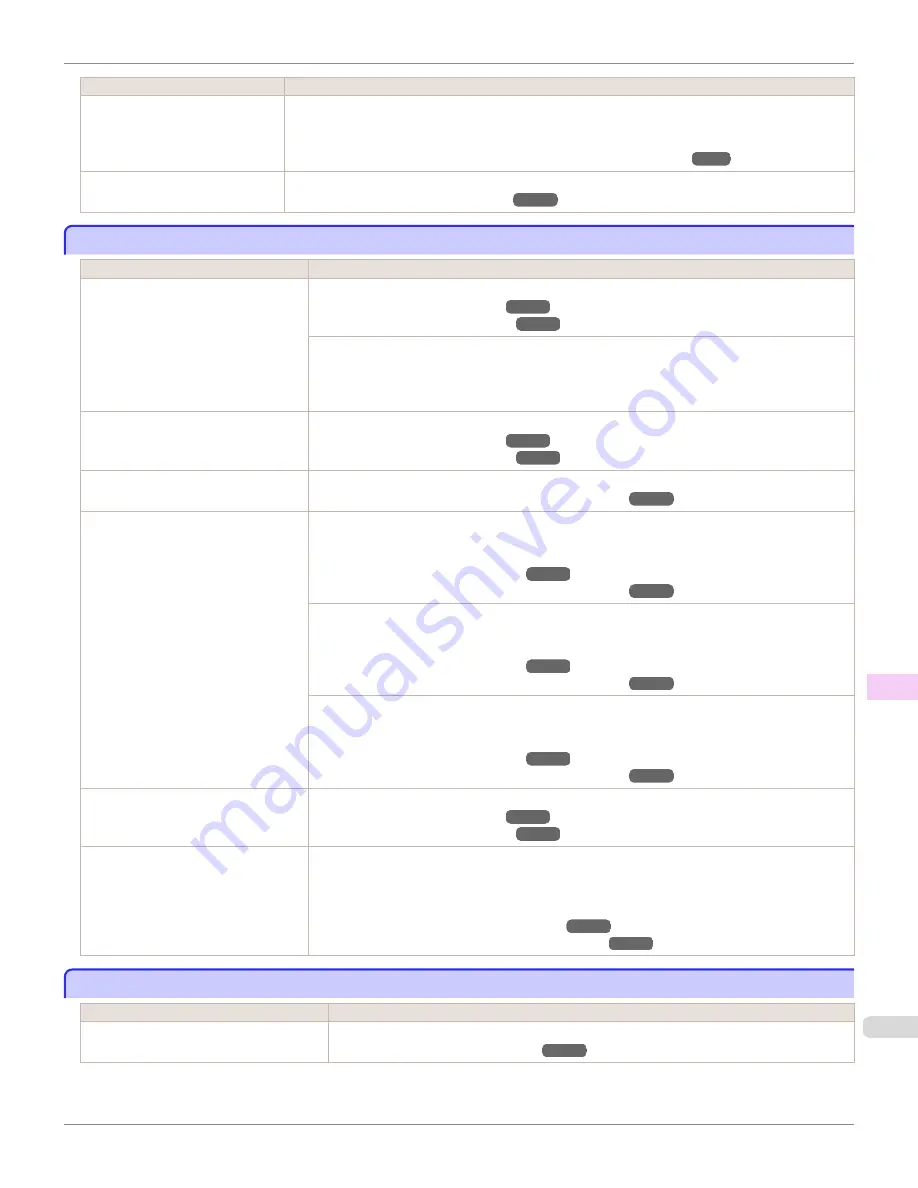
Cause
Corrective Action
Printing may be faint if
Print Quali-
ty
in
Advanced Settings
in the
printer driver is set to
Standard
or
Fast
.
In
Advanced Settings
of the printer driver, choose
Highest quality
or
High
in
Print Quality
.
Printing in
Fast
or
Standard
mode is faster and consumes less ink than in
Highest quality
or
High
modes, but the printing quality is lower.
(See "Giving Priority to Particular Graphic Elements and Colors for Printing.")
➔
P.59
You are printing on paper that
tends to generate dust when cut.
In the Control Panel menu, set
CutDustReduct.
in
Paper Details
to
On
.
(See "Reducing Dust from Cutting Rolls.")
➔
P.532
Paper rubs against the printhead
Paper rubs against the printhead
Cause
Corrective Action
The type of paper specified in the print-
er driver does not match the type loa-
ded in the printer.
Load paper of the same type as you have specified in the printer driver.
(See "Loading Rolls in the Printer.")
➔
P.510
(See "Loading Sheets in the Printer.")
➔
P.533
Make sure the same type of paper is specified in the printer driver as you have loaded in the printer.
1.
Press the
Stop
button and stop printing.
2.
Change the type of paper in the printer driver and try printing again.
Paper has been loaded incorrectly,
causing it to wrinkle.
Reload the paper.
(See "Loading Rolls in the Printer.")
➔
P.510
(See "Loading Sheets in the Printer.")
➔
P.533
The Printhead is set too low in the Con-
trol Panel menu.
In the Control Panel menu, set
Head Height
to
Automatic
.
(See "Troubleshooting Paper Abrasion and Blurry Images.")
➔
P.773
You are printing on heavyweight paper
or paper that curls or wrinkles easily af-
ter absorbing ink.
When printing on
Canon Heavyweight Coated Paper
or other paper-based media, choose a
Vac-
uumStrngth
setting of
Strong
or
Strongest
in the Control Panel menu. If rubbing still occurs, in the
Control Panel menu, use a higher
Head Height
setting.
(See "Adjusting the Vacuum Strength.")
➔
P.780
(See "Troubleshooting Paper Abrasion and Blurry Images.")
➔
P.773
When printing on
CAD Tracing Paper
or other film-based media, choose a
VacuumStrngth
setting
of
Standard
,
Strong
, or
Strongest
in the Control Panel menu. If rubbing still occurs, in the Control
Panel menu, use a higher
Head Height
setting.
(See "Adjusting the Vacuum Strength.")
➔
P.780
(See "Troubleshooting Paper Abrasion and Blurry Images.")
➔
P.773
When printing on paper 0.1 mm (0.004 in) thick or less, choose a
VacuumStrngth
setting of
Weak-
est
in the Control Panel menu. If rubbing still occurs, in the Control Panel menu, use a higher
Head
Height
setting.
(See "Adjusting the Vacuum Strength.")
➔
P.780
(See "Troubleshooting Paper Abrasion and Blurry Images.")
➔
P.773
When you have loaded paper, the paper
you have loaded does not match the
type selected on the Control Panel.
Be sure to select the correct type of paper in the Control Panel menu when loading paper.
(See "Loading Rolls in the Printer.")
➔
P.510
(See "Loading Sheets in the Printer.")
➔
P.533
Since the leading edge of the paper
curls strongly or ripples, the leading
edge of the paper rubs against the print-
head.
Set
Cutting Mode
to
Manual
on the Control Panel menu, and select
Do not perform
for the paper
leading edge detection setting.
In this case, when keeping track of the amount of roll paper left, set
ManageRemainRoll
to
Off
before loading the roll paper and then set
ManageRemainRoll
to
On
after loading the roll paper.
(See "Specifying the Cutting Method for Rolls.")
➔
P.523
(See "Keeping Track of the Amount of Roll Paper Left.")
➔
P.521
The edges of the paper are dirty
The edges of the paper are dirty
Cause
Corrective Action
The Platen has become dirty after border-
less printing or printing on small paper.
Open the Top Cover and clean the Platen.
(See "Cleaning Inside the Top Cover.")
➔
P.907
iPF8400S
Paper rubs against the printhead
User's Guide
Troubleshooting
Problems with the printing quality
935
Summary of Contents for imagePROGRAF iPF8400S
Page 344: ...iPF8400S User s Guide 344 ...
Page 494: ...iPF8400S User s Guide 494 ...
Page 620: ...iPF8400S User s Guide 620 ...
Page 704: ...iPF8400S User s Guide 704 ...
Page 782: ...iPF8400S User s Guide 782 ...
Page 918: ...iPF8400S User s Guide 918 ...
Page 952: ...iPF8400S User s Guide 952 ...
Page 978: ...iPF8400S User s Guide 978 ...
Page 992: ...WEEE Directive iPF8400S User s Guide Appendix Disposal of the product 992 ...
Page 993: ...iPF8400S WEEE Directive User s Guide Appendix Disposal of the product 993 ...
Page 994: ...WEEE Directive iPF8400S User s Guide Appendix Disposal of the product 994 ...
Page 995: ...iPF8400S WEEE Directive User s Guide Appendix Disposal of the product 995 ...
Page 996: ...WEEE Directive iPF8400S User s Guide Appendix Disposal of the product 996 ...
Page 997: ...iPF8400S WEEE Directive User s Guide Appendix Disposal of the product 997 ...
Page 998: ...WEEE Directive iPF8400S User s Guide Appendix Disposal of the product 998 ...
Page 999: ...iPF8400S WEEE Directive User s Guide Appendix Disposal of the product 999 ...
Page 1000: ...iPF8400S User s Guide 1000 ...
Page 1003: ...1003 ...






























